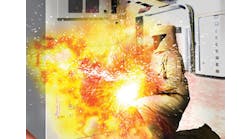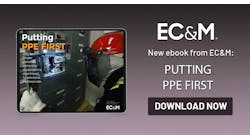A flammable material will burn only when the air contains a sufficient concentration of it. Not only is this an underlying principle of the Chapter 5 requirements for hazardous locations, it's a key principle to apply when working near, or with, flammable materials.
Here are some tips to follow when working around flammables:
- If you're the one using a flammable material, read the label and the MSDS. Understand the heat limits, ventilation requirements, and PPE requirements. If the correct PPE isn't available, don't use the flammable material.
- Don't mix flammable chemicals with other chemicals. Doing so can increase the fire hazard and/or create toxic vapors.
- Before bringing flammables into an area, find and remove all ignition sources. This may require lockout/tagout. There's no such thing, for example, as "just a little" hexane when you bring a container of it near an ignition source.
- If you must use a flammable solvent in a battery room, do the cleaning immediately and remove the container when done.


